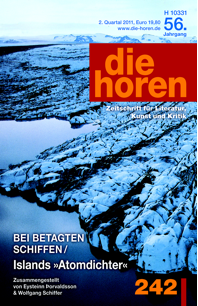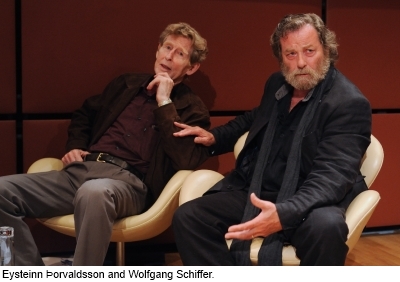Iceland's Atom Poets
 The quarterly journal die horen recently put out a ambitious volume dedicated to the Icelandic post-war writers collectively known as the “Atom Poets”. The term was applied, derisively at first, to an upstart group of poets who did away with the strict rules of rhyme, rhythm and alliteration that had dominated Icelandic poetry for the better part of a millennium. Amid much furore and public indignation, the Atom Poets – who quickly co-opted the moniker and wore it with pride – permanently added free verse and other modernistic elements to the palette of Icelandic poetry, ushering in a new literary era in the process.
The quarterly journal die horen recently put out a ambitious volume dedicated to the Icelandic post-war writers collectively known as the “Atom Poets”. The term was applied, derisively at first, to an upstart group of poets who did away with the strict rules of rhyme, rhythm and alliteration that had dominated Icelandic poetry for the better part of a millennium. Amid much furore and public indignation, the Atom Poets – who quickly co-opted the moniker and wore it with pride – permanently added free verse and other modernistic elements to the palette of Icelandic poetry, ushering in a new literary era in the process.
The new book, titled Bei betagten Schiffen (lit. By Time-Worn Ships), contains a wealth of poems – most of them translated into German for the first time – as well as many documents contemporaneous with the works: manifestos, illustrations, correspondence and newspaper clippings, and new essays and reminiscences by modern authors. On the eve of the volume's launch at the Icelandic Embassy, we spoke to Mr Wolfgang Schiffer, who co-edited the volume with Eysteinn Þorvaldsson.
For the past 25 years or so, the author, translator and editor Schiffer has been indefatigable in bringing Icelandic literature to German readers. With the current volume on the Atom Poets, however, he claims to have finally addressed a topic particularly dear to him.
How did the idea of putting out a book on the Atom Poets arise?
 “The journal die horen has been publishing Icelandic literature, especially poetry, since the mid-eighties, and this brought us into contact with individual works by the Atom Poets from time to time. Then, when it became known that Iceland was to appear as Guest of Honour at this year's Frankfurt Book Fair, the chief editor of die horen, Johann P. Tammen, immediately asked me whether I wanted to publish something special for the occasion. I didn't need to think long before suggesting a book on the Atom Poets. Their early poems especially, which on their publication sparked intense controversy in Iceland, as well as their profound influence on Icelandic poetry – these are subjects that I have always found both exciting and important.
“The journal die horen has been publishing Icelandic literature, especially poetry, since the mid-eighties, and this brought us into contact with individual works by the Atom Poets from time to time. Then, when it became known that Iceland was to appear as Guest of Honour at this year's Frankfurt Book Fair, the chief editor of die horen, Johann P. Tammen, immediately asked me whether I wanted to publish something special for the occasion. I didn't need to think long before suggesting a book on the Atom Poets. Their early poems especially, which on their publication sparked intense controversy in Iceland, as well as their profound influence on Icelandic poetry – these are subjects that I have always found both exciting and important.
“I found an ideal partner for the project in Eysteinn Þorvaldsson, a wellspring of knowledge on Icelandic poetry, and thanks to the support of Sagenhaftes Island and other patrons mentioned in the book, the financial issues were also resolved.”
“The common reader was involved”
The intense dispute about the Atom Poets was not limited to a circle of insiders – it involved Icelandic society as a whole. What was it, exactly, that the opponents of Atom Poetry felt was at stake?
“Mainly, they were afraid of losing their cultural identity, of witnessing the disintegration of a centuries-old cultural tradition. Icelandic poetry was still bound by a myriad of elaborate rules, poetic forms, rhyming and alliteration schemes – a poem was only a poem if it observed these conventions. Even translations of foreign poetry were fitted into this framework. And now there were suddenly poets who were in step with modern developments, writing their poetry in free verse. To many, this was not only an indication of poetic ineptitude, but of a growing foreign influence that needed to be resisted.”
Conflicts are often easier to understand through the telling of anecdotes. Can you share any such stories of the Atom Poets?
“The book contains numerous excerpts from newspapers of the time, which often printed sharply denunciatory articles on the new movement. However, there is also a satirical poem about the Atom Poets in there, written and submitted by a postman, which goes to show that the “common” reader was involved in the dispute as well.
One significant example of the conflict can be found in a news item about an official event organized by the Icelandic Student Society on March 26, 1952, where the opponents and proponents of Atom Poetry were pitted against each other. During the heated talks, the traditionalists soon abandoned all verbal restraint – “barbarism” was one of the more moderate terms employed – while the proponents more reasonably pointed out that a worldwide revolution was underway in literature. And since the fronts were divided in precisely this way and none other, this literary dispute has an international bearing as well.
To which degree would you say that the Atom Poets weren't “typically” Icelandic?
“Typically Icelandic only means that the country was relatively late in adopting modernism in its poetry (or its visual art or music, for that matter). The reason, no doubt, lies in Iceland's longstanding isolation, which was only broken, dramatically so, by the Second World War.
The country's subsequent declaration of independence in 1944 catapulted the largely agrarian society into a period of rapid urbanization and modernization; at the same time, however, the Icelandic people remained extremely conscious of their national identity and traditions. In retrospect, therefore, the intensity of the dispute seems inevitable.
“However, the ongoing dialogue with tradition is also apparent with the Atom Poets themselves, and in some of their work. It's an interesting sort of friction that animates their poetry with a feeling unique to Iceland.”
The legacy of Atom Poetry
The list of contributors to the book reads like a “who is who” of Icelandic contemporary literature. You have had good relations with these authors, many of whom were published in German for the first time in die horen. Nevertheless, the number of well-known names is remarkable, and surely an indication of the prestige that the Atom Poets eventually came to enjoy. How would you describe their legacy today?
“One example of the changing views on Atom Poetry could be observed in 1990, when the Icelandic Literary Prize was established, and the Atom Poet Stefán Hörður Grímsson was chosen as its first recipient. Iceland has long since accepted its Atom Poets and acknowledged their contribution. This is especially true of subsequent generations of writers, some of whom also contributed essays and articles to the book. They were, and are, grateful to the older poets for casting off the fetters of tradition and laying the groundwork for a polyphonic literary landscape, characterized by the interplay between old and new, through which subsequent writers could plot their own individual course.”
What is it that makes Atom Poetry interesting? Where does its charm lie?
“Apart from the fact that these are good poems, I feel that they reveal an urgent personal need for new forms of expression, capable of doing justice to a fundamentally altered reality – a reality following in the wake of World War II, Hiroshima and Nagasaki. But of course, quality and the quest for new modes of expression aren't mutually exclusive. On the contrary, each calls for the other.”
Would you, in conclusion, be so kind as to give us an example of Atom Poetry, one that might give our readers a fair idea of the book?
“Singling out just one poem is not easy, but I will go with the anthology's title poem, “By time-worn ships” (orig. “Hjá hrumum skipum”) by Stefán Hörður Grímsson:
By time-worn ships
I awaited passage,
the surf's strange
song in my ears,
and watched as the wind
carried sand
into the eyes of each day.
Off a red coach
stepped the dusk,
onto cold sand,
naked, pale.
And the night wore
jet-black shoes,
and the night danced on
in my crimson heart
in jet-black shoes.”
Interview: Thomas Böhm
Translated from the German by Steingrímur Teague
Photo: Sabine Schirdewahn